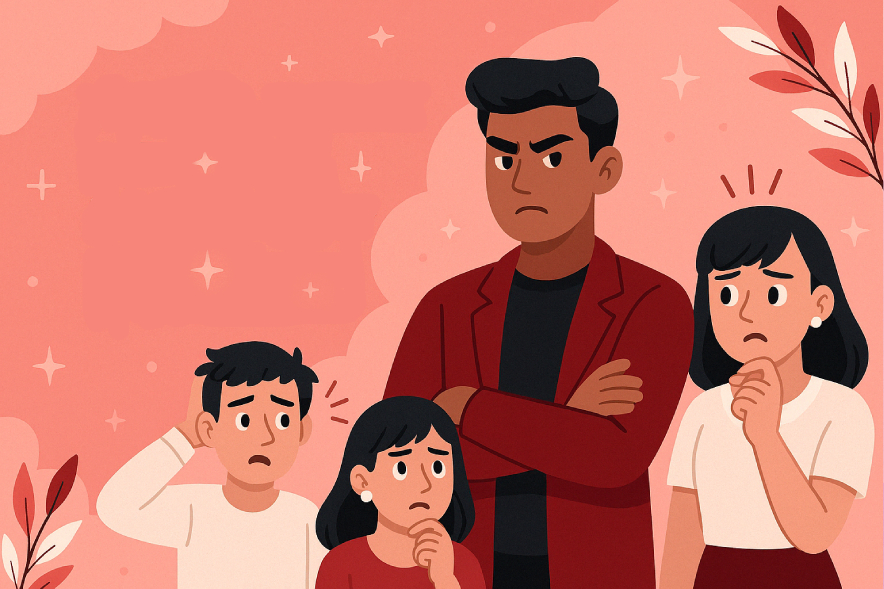You get labeled “too much” for just... existing
Ever been told you’re “too intense,” “too direct,” or “too confident,” when all you did was speak like a normal human? If you say what you mean, don’t sugarcoat stuff, and aren’t afraid of silence, some people might find that overwhelming. Especially in a world where folks expect everything to be wrapped in emojis and disclaimers.
And hey, being straightforward isn’t rude—it’s just efficient. But to people who are used to small talk and vague suggestions, it can feel like you’re showing up with a verbal power tool when they were expecting a butter knife.
People think you’re mad... when you’re just existing
This one’s a classic. You’re just sitting there, thinking about what to eat for dinner, and someone goes, “Are you okay? You look mad.” And you're like, no, I’m just hungry and trying to remember if I still have pasta at home.
Apparently, having a serious face or being quiet = scary to some folks. It’s what psychologists call “resting authority face.” Not a real term, but it should be.
According to a study in the Journal of Research in Personality, people who come off as dominant or confident are more likely to be perceived as aggressive—even when they’re not doing anything aggressive at all. Wild, right?
Small talk feels like a slow death
You don’t care what someone's dog's name is or how many cousins they have in Michigan. You're not rude about it, but you just don’t have the energy for surface-level chit-chat. You want conversations that actually go somewhere. But a lot of people rely on small talk to ease into things. So when you skip right to the real stuff, they don’t know what to do.
It’s kind of like skipping the appetizer and diving right into steak. (Okay, maybe we do use that word sometimes.)
You don’t try to fit in—and people notice
You don’t fake-laugh at bad jokes. You don’t say “yes” just to avoid awkward moments. And you definitely don’t change your opinions to match the crowd. That kind of self-assurance can throw people off—especially those who rely on approval or go with the flow.
And sure, there’s nothing wrong with being agreeable. But when you’re the person who calmly says, “Actually, I don’t think that makes sense,” in the middle of a group think-fest... it hits different.
And let’s be real: some folks just aren’t used to people who are solid in themselves.
You ask real questions—and expect real answers
You don’t do passive-aggressive. If someone’s being weird, you ask them what’s up. If something feels off, you bring it up. Not in a confrontational way, just... honestly. But this kind of honesty can make people squirm. Especially if they’re used to bottling things up and pretending everything’s fine while their eye twitches.
The truth is, not everyone is ready for people who actually say what they think. And when you’re that person, you can come across as, yep—intimidating.
You make decisions without asking for a group vote
Another sign you’re intimidating? You make decisions like an adult. You don’t need five people to agree on where to go for lunch. You say, “I’m going here, feel free to join,” and move on. That kind of clarity is like black coffee—strong, straightforward, and not for everyone.
It’s not about being bossy. It’s about not overcomplicating things. But again, to people who thrive on consensus, it can feel like you’re steamrolling—even when you’re just trying to eat a sandwich before 2 p.m.
You don’t freak out easily—and it confuses people
Someone’s in crisis. You stay calm. You don’t panic. You’re like a human weighted blanket. And weirdly, people sometimes react to that with... more panic. Why? Because they’re used to everyone matching their level of freakout.
Staying grounded in chaos isn’t something everyone knows how to do. So when you do it naturally, it can feel intimidating. Like you're from another planet where people don't fall apart over a late email.
You're not afraid to be alone
This one’s huge. A lot of people are constantly chasing attention, approval, or just someone to text back. But if you’re cool being alone—if you're totally fine chilling with a book, your favorite show, or reorganizing your snack drawer—that quiet confidence stands out.
People can’t figure you out. You’re not desperate. You’re not clingy. You’re just... good. And that can be weirdly threatening to folks who don’t know how to sit with themselves.
Okay, but is being intimidating a bad thing?
Nope. Not at all. In fact, being intimidating usually just means you have strong boundaries, high standards, and a clear sense of self. None of that is bad. But it can make some people feel uncomfortable—not because you're doing anything wrong, but because they’re not used to that energy.
You’re not scary. You’re solid. You don’t ask for attention—you just get it. Not because you're loud, but because you're centered. And that can shake things up.
So if you’re wondering why people seem a little on edge around you...
It might not be about what you’re doing wrong. It might be one of those subtle signs you're intimidating—just by being your regular, confident, emotionally self-aware self.Keep being that person. Own your energy. Smile if you feel like it. Don’t if you don’t. And for the love of coffee, stop apologizing for being direct.
You’re not the problem. You’re just not fake. And that? That’s powerful.
